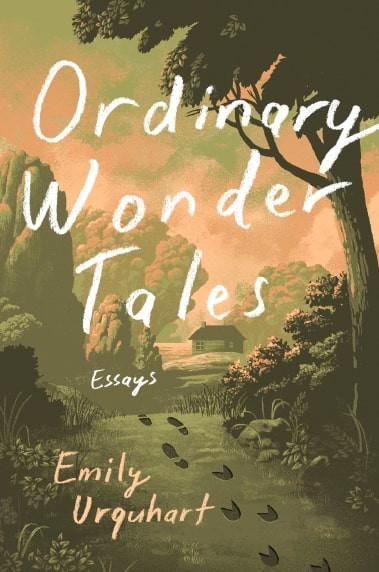Ordinary Wonder Tales: Fantasy Meets Daily Experience
Emily Urquhart Contrasts Her Life With Folklore and Legend
I often have a difficult time justifying reading books that aren't academic as a university student. As I sit doing something that supposedly brings pleasure, I chastise myself for not devoting this time to my ever accumulating pile of readings.
Perhaps, I am not choosing books that offer an escape that I intuitively associate with the act of reading for pleasure. This is where Ordinary Wonder Tales by Emily Urquhart differs.
Alternating between intimate family tales and related myths, Urquhart paints a nostalgic image, stringing along certain comforts that satiated my yearn for escapism.
Emily Urquhart is a freelance writer whose work has appeared in the Toronto Star, The Literary Review of Canada and Guernica Longreads. She draws on her doctorate in folklore to incorporate legend and myths in her novels. With a large repertoire of pieces, many of which have been nominated for awards within the National Magazine Awards, Urquhart demonstrates her skill for weaving her knowledge of myth and legend into non fiction. Ordinary Wonder Tales is a great example of this. It is a personal account of her life experiences, from tales of ghost stories she saw as a child, to being a mother herself. Within all the stories encompassed in her memoir, she draws on mythical elements to illustrate the lessons she’s learned.
When seeking literary escape, I tend to gravitate towards fantasy books that I devoured in my middle school days. I'll be the first to admit that I still enjoy reading the Harry Potter series on a rainy October afternoon.
Ordinary Wonder Tales acts as a more mature alternative to this. Urquhart’s corrobation of legends to day-to-day life offers the same getaway and warmth that indulging in a supernatural world can. So, to all the retired fantasy lovers out there, please do yourself a favor and read this book.
Urquhart skillfully employs imagery throughout, illustrating her most intimate moments through well-placed details. She transcribes her experience conducting fieldwork in a small Newfoundland town with personal and emotional language. She refers to her research method at this time as “mythological doom scrolling, the grimmer the legend, the more sated I am. I go to bed only once I've read the worst, most appalling pestilence tale I can find.” In this journal-like read, she adeptly invites the reader to be her confidante. Ordinary Wonder Tales is a vulnerable work that reads like delving into memories of a life that could've been yours.
In her set of essays entitled Lessons for Female Success, Urquhart details experiences of hers in which she was either victim to or learner of the dangers of being a woman. She accompanies these stories with myths of a woman escaping her killer, noting the abnormality that the woman survives in the end. The tales she uses in these essays soften the sharp edges of female trauma, and allow the reader and herself to give their story an alternate ending, one in which they are the heroine who escapes. As Urquhart puts it, the use of the supernatural is well-suited for telling a woman's story because; “It can't be taken down, it's yours. And it belongs to you. And nobody can go in there and try to tell you that it isn't right because it exists only in your own head. So it has a power of its own in that way”
Detailing experiences of her own childhood, family and being a parent herself, Urquhart maps out a comprehensive tale of a life lived. Like any other, this life story holds pain, but Urquhart also brings attention to the joys of motherhood and family. She turns her own experiences into family folklore to share with her children, and within these stories uses legend to allow her kids an understanding of her experiences. The kinship that she holds with her children is continuously incorporated into her stories. They act as a participatory audience for these tales, alternating between inspiration for her storytelling and sources of comfort. Though this book does not highlight her motherhood as a primary component of her storytelling, her children are omnipresent in the novel, lending love and understanding to her tales.
I found comfort reading this book. This novel uses myths as a mother's forehead kiss, or an all too knowing hand-squeeze of a friend at the end of a particularly bad night. My inner child's desire for fantasy was left equally satiated. Ordinary Wonder Tales has opened my eyes to the ways that the mythical can allow opportunity for women to tell their own story in a forgiving environment. It has encouraged me to seek out other narratives that do the same.







